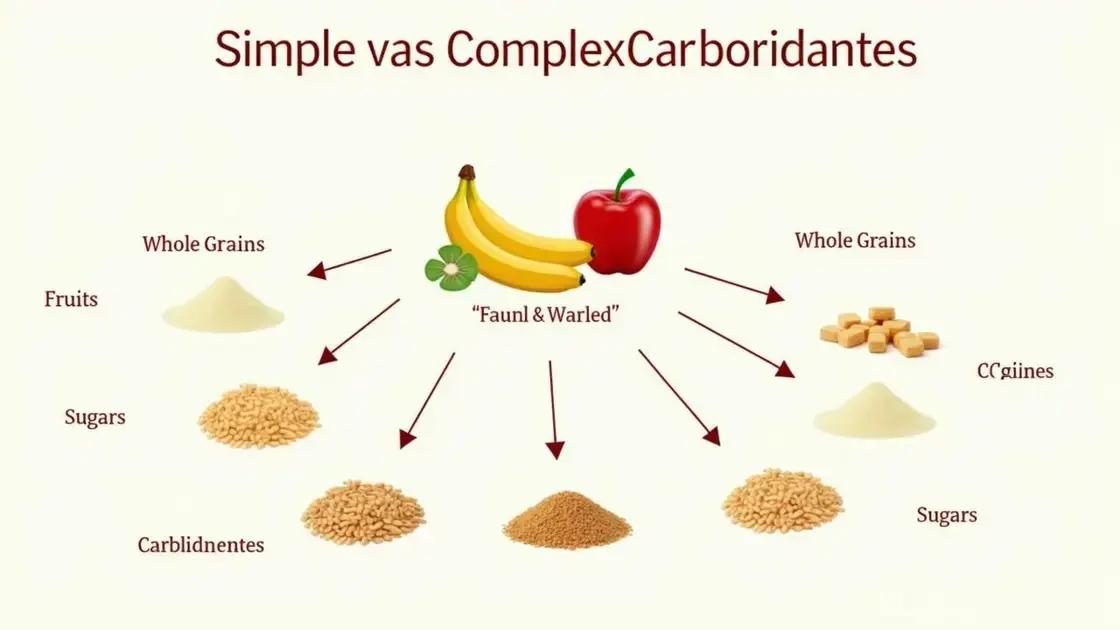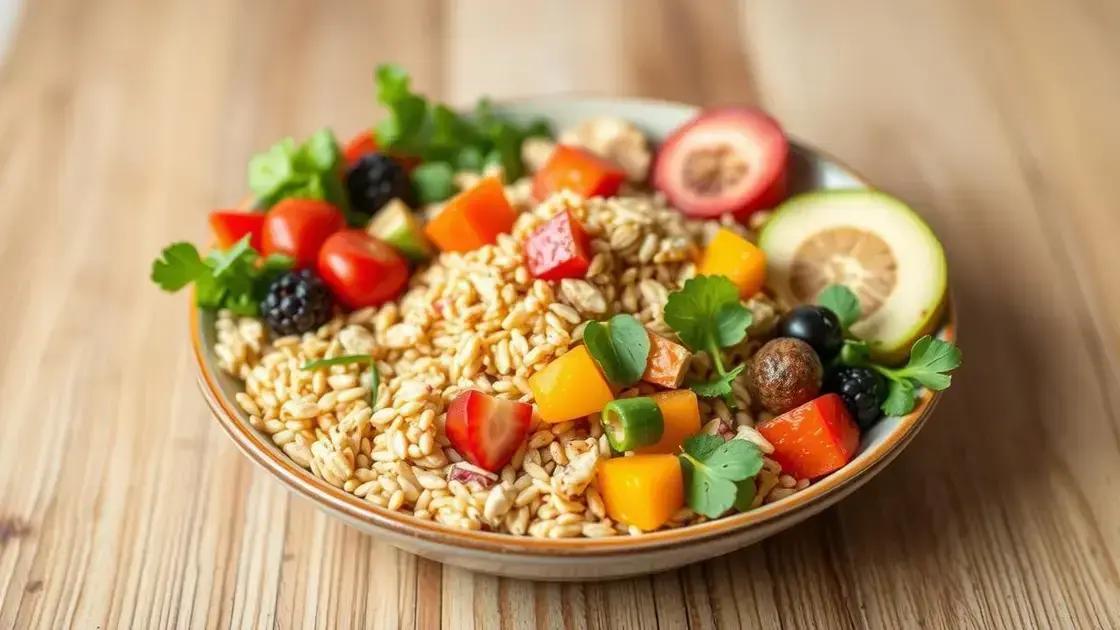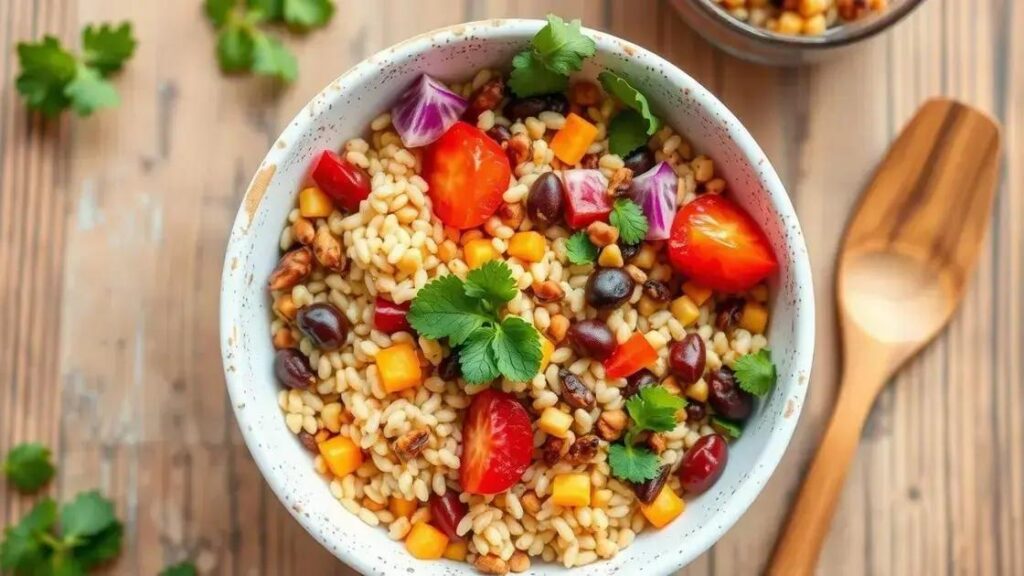Healthy carbohydrates, such as whole grains, fruits, and vegetables, are essential for balanced nutrition as they provide energy, nutrients, and fiber. Incorporating these into your meals supports overall health, aids in weight management, and helps regulate blood sugar levels.
Healthy carbohydrates play a crucial role in balanced nutrition. They provide essential energy that fuels your daily activities. Many people tend to misunderstand carbs, thinking they should be avoided. However, when chosen wisely, carbs can be beneficial and even help manage weight. In this article, we’ll delve into the importance of healthy carbs in your diet, explore their benefits, and dispel common myths that surround them.
Understanding Carbohydrates

Carbohydrates are one of the three main macronutrients, along with proteins and fats. They are essential for providing energy to our bodies, especially for the brain and during physical activity. Carbs can be divided into two main categories: simple and complex carbohydrates.
Simple Carbohydrates
Simple carbohydrates consist of one or two sugar molecules. They are quickly absorbed by the body and can provide a rapid source of energy. Examples include sugar found in fruits (fructose) and those added to foods (sucrose). While they can offer quick energy, consuming too many simple carbs, especially from processed foods, can lead to spikes in blood sugar levels.
Complex Carbohydrates
Complex carbohydrates, on the other hand, are made up of longer chains of sugar molecules. They are found in foods like whole grains, beans, and vegetables. These types of carbs take longer to digest, leading to a more gradual increase in blood sugar levels. This makes them a healthier choice, as they provide sustained energy.
Types of Carbohydrates
When discussing carbohydrates, it is also important to mention dietary fiber. Fiber is a type of complex carbohydrate that the body cannot digest. It is crucial for digestive health and can help prevent constipation. Foods high in fiber, like fruits, vegetables, and whole grains, also help you feel full and satisfied.
The Importance of Carbohydrates
Understanding carbohydrates is vital for making informed dietary choices. They play a significant role in a balanced diet by providing energy, supporting metabolic functions, and contributing to overall health. It’s essential to focus on choosing healthy carbs, such as whole grains and fruits, rather than processed and sugary options.
Health Benefits of Whole Grains

Whole grains are an important part of a healthy diet, and they offer several health benefits. Unlike refined grains, whole grains contain all parts of the grain—namely the bran, germ, and endosperm. This means they are rich in nutrients and fiber that are often lost during processing.
Nutrient-Rich
Whole grains are packed with essential vitamins and minerals. They provide B vitamins, iron, magnesium, and antioxidants. These nutrients are vital for various body functions, including energy production and maintaining healthy cells.
High in Fiber
One of the notable benefits of whole grains is their high fiber content. Fiber helps regulate digestion, prevents constipation, and keeps you feeling full longer. Eating fiber-rich foods like whole grains can help control appetite and support weight management.
Heart Health
Consuming whole grains may lower the risk of heart disease. Studies show that diets high in whole grains can reduce levels of bad cholesterol and lower blood pressure. The fiber and antioxidants in whole grains contribute to heart health by promoting better blood flow and reducing inflammation.
Improved Blood Sugar Control
Whole grains can help regulate blood sugar levels. Because they digest more slowly than refined grains, they lead to a gradual rise in blood sugar, which is beneficial for preventing spikes. This is especially important for individuals with diabetes or those at risk of developing it.
Weight Management
Incorporating whole grains into your meals can aid in weight management. Their fiber content promotes satiety, which may reduce overall calorie intake. Plus, whole grains have been linked to a lower risk of obesity, making them a smart choice when looking to maintain a healthy weight.
Incorporating Healthy Carbs into Meals

Incorporating healthy carbs into your meals is easier than you might think. With the right choices, you can boost your energy levels and improve your overall health. Here are some simple ways to add healthy carbohydrates to your diet.
Choose Whole Grains
Start by replacing refined grains with whole grains. For example, swap white rice for brown rice or whole grain quinoa. Use whole-wheat bread instead of white bread for sandwiches. Whole grains not only provide more nutrients, but they also keep you fuller for longer.
Include Fruits and Vegetables
Fruits and vegetables are excellent sources of carbohydrates. They are rich in vitamins, minerals, and fiber. Incorporate a variety of colorful fruits and veggies into every meal. Add sliced bananas or berries to your breakfast cereal, or toss a salad filled with greens and mixed vegetables for lunch.
Snack Smart
Choose healthy snacks that contain carbohydrates. Options like hummus with whole-grain crackers or an apple with almond butter are nutritious and satisfying. These snacks help fill you up without leading to energy crashes later on.
Plan Your Meals
When planning meals, focus on balancing your plate. Aim to include a source of healthy carbs, such as lentils or sweet potatoes. Pair these with lean proteins and healthy fats for a well-rounded meal. This balance helps maintain energy and supports good nutrition.
Experiment with Legumes
Legumes like beans, lentils, and chickpeas are great sources of healthy carbohydrates. They are also packed with protein and fiber. Add them to soups, salads, or stir-fries. They can be a delicious and filling addition to any dish.
Common Myths About Carbs

There are many myths surrounding carbohydrates that can lead to confusion. Let’s debunk some of the most common misconceptions about carbs.
Myth 1: All Carbs Are Bad
Many people believe that all carbohydrates lead to weight gain. However, this is not true. Healthy carbs, such as whole grains, fruits, and vegetables, are essential for good health. It’s important to focus on quality rather than cutting out all carbs.
Myth 2: Carbs Make You Gain Weight
Another common myth is that eating carbs automatically leads to weight gain. Weight gain occurs when you consume more calories than your body needs. Healthy carbs can be part of a balanced diet and can help maintain a healthy weight when eaten in moderation.
Myth 3: Low-Carb Diets Are the Best
Many diets promote low-carb eating as the best approach to health. While some may benefit from reducing carbs, it is not necessary for everyone. Balanced intake of healthy carbohydrates can support energy levels and overall health.
Myth 4: Carbs Are Only Found in Bread and Pasta
People often think carbs come only from starchy foods like bread and pasta. In reality, carbohydrates are also found in fruits, vegetables, legumes, and dairy products. These foods provide valuable nutrients and fiber, which support overall health.
Myth 5: You’ll Lose Muscle Without Low Carbs
Some believe that avoiding carbs will help maintain muscle mass. However, carbohydrates are important for fueling workouts and recovery. Consuming adequate healthy carbs can help preserve muscle while promoting fat loss.
Understanding the Role of Healthy Carbs in Your Diet
Healthy carbohydrates are a vital part of balanced nutrition. They provide energy, essential nutrients, and can contribute to overall wellness. By including whole grains, fruits, vegetables, and legumes in your meals, you can enjoy the many health benefits they offer.
It’s important to challenge common myths surrounding carbohydrates and focus on incorporating the right types into your diet. Remember that not all carbs are created equal, and making informed choices can help you maintain a healthy lifestyle.
Incorporating healthy carbs into your meals is simple and rewarding. With the right approach, healthy carbohydrates can fuel your body, keep you satisfied, and improve your overall health.
FAQ – Frequently Asked Questions About Healthy Carbs
What are healthy carbohydrates?
Healthy carbohydrates include whole grains, fruits, vegetables, and legumes. They provide essential nutrients and energy without causing spikes in blood sugar.
Why are whole grains important?
Whole grains are important because they contain more nutrients and fiber than refined grains. They help with digestion and promote heart health.
Can I eat carbs and still lose weight?
Yes, you can eat healthy carbs and still lose weight. The key is to choose whole, unprocessed carbs and control portion sizes.
What are some examples of healthy snacks that include carbs?
Healthy snacks include hummus with veggies, fruit with yogurt, or whole grain toast with avocado. These options are nutritious and satisfying.
Should I avoid carbs to be healthy?
No, avoiding carbs is not necessary for good health. Focus on incorporating healthy carbs into your balanced diet while limiting processed and sugary options.
How do I incorporate more healthy carbs into my meals?
Include whole grains, fruits, and vegetables in your meals by choosing them over refined options, adding them to salads, or using them as sides in your dishes.












